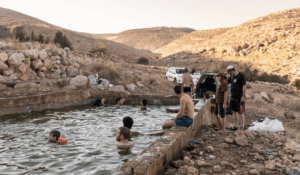Israeli settlers take over spring, damage wells that supply water to 30 Palestinian West Bank villages

Israeli settlers in Ein Samiya spring, early July 2025
Hagar Shezaf reports in Haaretz on 25 July 2025:
Israeli settlers seized the Ein Samiya spring in the West Bank and vandalized Palestinian pumping stations that supply water to 30 villages in the Ramallah area, diverting the water to a nearby pool.
Ein Samiya contains five wells operated by the Jerusalem Water Undertaking, which settlers have vandalized four times over the past month.
Despite the repeated attacks, the IDF has neither deployed forces to protect the site nor intervened to halt the settlers’ actions, and no suspects have been arrested.
According to the Jerusalem Water Undertaking, 18 villages rely entirely on Ein Samiya for their water supply, while 14 other Palestinian communities receive part of their water from the site.
JWU told Haaretz that the vandalism involved destroying security cameras and damaging the wells’ pumping and control systems, leading to several prolonged water outages. The company added that the pool seized by settlers is owned by a farmer from Kafr Malik, and that its employees have been unable to access the site due to the settlers’ ongoing presence.
The settlers have renamed the pool Ma’ayan HaRo’im (“Shepherds’ Spring”) in memory of two settlers killed in a 2023 terrorist attack at a gas station near the settlement of Eli. They also launched a crowdfunding campaign on the Givchak platform, raising over 110,000 shekels (approximately $33,000) to date.
In a video released by the settlers, they claimed that the spring is the largest in the Samaria region and that water has been pumped from it to the Ramallah area since 1965. “We didn’t give up. After tremendous efforts, Shepherds’ Spring is coming back to life,” said Micha Sudai, who owns a nearby farm outpost. The settlers have planted potted plants around the pool, and every Friday, a food stand is set up at the site. They say their next goal is to divert the water to Wadi Auja, a stream that runs through a nature reserve.
A statement from the IDF Spokesperson’s Unit said that “several reports have been received regarding deliberate damage by Israelis to water infrastructure in the Ein Samiya area,” adding that “army forces were dispatched to the scene, but no suspects were located.” “The security forces responsible for the area take such incidents seriously,” the statement continued, noting that “the Civil Administration acted to enable the Palestinian Water Authority to access the site and carry out the necessary repairs.”
Damage to the spring compounds the worsening water crisis affecting several areas in the West Bank in recent months, following the severe drought last winter.
Ein al-Auja, the largest spring in the Jordan Valley, has completely dried up. On average, it supplies 13 million cubic meters of water annually, flowing through the Wadi Auja nature reserve to a water source used by Palestinian villages in the area.
While the spring typically dries up once every decade in July, this year it ran dry as early as May. As a result, Palestinians have been forced to buy water from local suppliers and transport it to the area by tanker trucks.
This article is reproduced in its entirety
